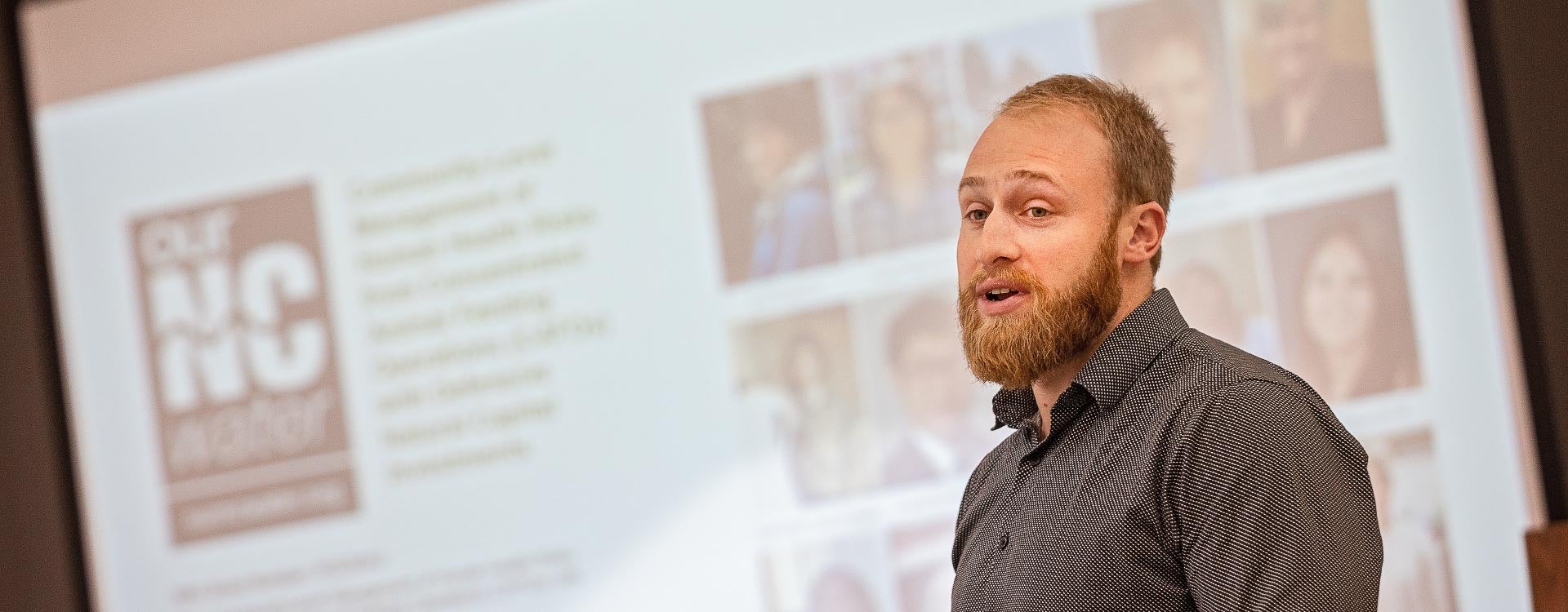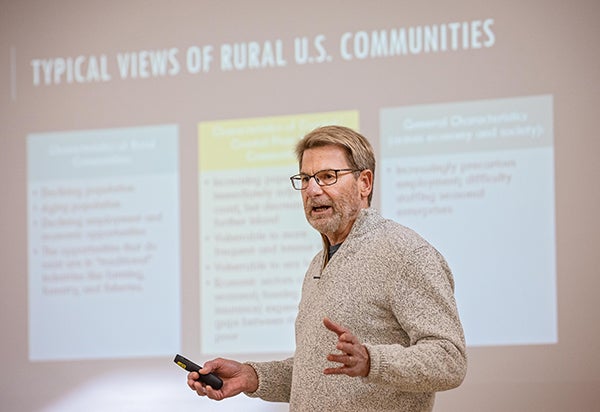Resiliency the theme of third annual Coastal Conversations Conference
Researchers from across the state came together Friday to share their work on the health and resiliency of North Carolina’s coast at the third annual Coastal Conversations Conference at East Carolina University.
As hurricanes, storms and an ever-expanding tourism industry continue to shape the future of the state’s coastal plain, research on how to keep the region healthy despite environmental and man-made threats becomes vital.

Assistant professor Jacob Hochard addresses the crowd at the third annual Coastal Conversations Conference. The conference brought researchers together from across the state to share their work. (Photos by Cliff Hollis)
Nearly three dozen researchers packed the auditorium at ECU’s Willis Building to listen to insights from their peers from ECU, the Albemarle Pamlico National Estuary Partnership (ANEP), the University of North Carolina Institute of Marine Sciences, Duke University, North Carolina Sea Grant, the University of North Carolina at Wilmington, North Carolina State University and the North Carolina Coastal Federation.
Erin Fleckenstein, a coastal scientist and manager of the North Carolina Coastal Federation’s northeast regional office, said having an opportunity to see the programs and projects of other researchers helps her organization connect with various stakeholders.
“The Coastal Federation works to bridge the gap between different communities,” Fleckenstein said. “Conferences like Coastal Conversations at ECU are important because our programs rely on the science coming out of research institutes in North Carolina. Bringing back the research everyone shares today is important to our different constituencies so everyone knows what helps the coast thrive and what challenges we still face.”

ECU coastal studies department chair David Griffith presents his research on rural coastal communities at the third annual Coastal Conversations Conference.
A trio of ECU research groups – including David Griffith, Jacob Hochard, Roger Rulifson, Erin Field and Michael Brewer – presented their work during the afternoon session titled “North Carolina Coast: Future with focus on coastal economic and rural prosperity.”
Griffith’s presentation focused on optimistic developments observed in rural communities along North Carolina’s coast, particularity on the importance of immigrants and entrepreneurship in the region.
Griffith’s research found that the next generation of coastal entrepreneurs isn’t dying, but that it’s evolving, often combining multiple streams of income and leaning on support networks, including fishing organizations like Brunswick Catch.
Reide Corbett, dean of ECU’s Integrated Coastal Programs and director of the Coastal Studies Institute, said this year’s theme of coastal resiliency was an important issue to tackle after facing three major hurricanes in a four-year period.
“We’ve seen major events, but we’ve seen the state respond to that,” he said. “From the science perspective, we need to think about better ways to communicate. What can we do to work together with one another and work alongside our communities and policymakers to improve the coast?”
Corbett added that bringing together researchers with different backgrounds, including anthropologists, economists and biologists, to name a few, was essential to protect the coast’s future.
“We have these incredibly tough problems facing our coast – from storms to sea level rise – and they can’t be solved by a single discipline,” Corbett said. “We have to move forward with interdisciplinary science. This workshop brings together scientists from a lot of different disciplines that have experience working in teams. Working together is the only way we’re going to be able to face the challenges affecting North Carolina’s coast.”
ECU’s Integrated Coastal Programs and Department of Coastal Studies, the George Institute for Biodiversity and Sustainability, and ANEP sponsored this year’s event. The previous conferences took place at North Carolina State University and Elizabeth City State University.
-by Matt Smith, University Communications